Eating
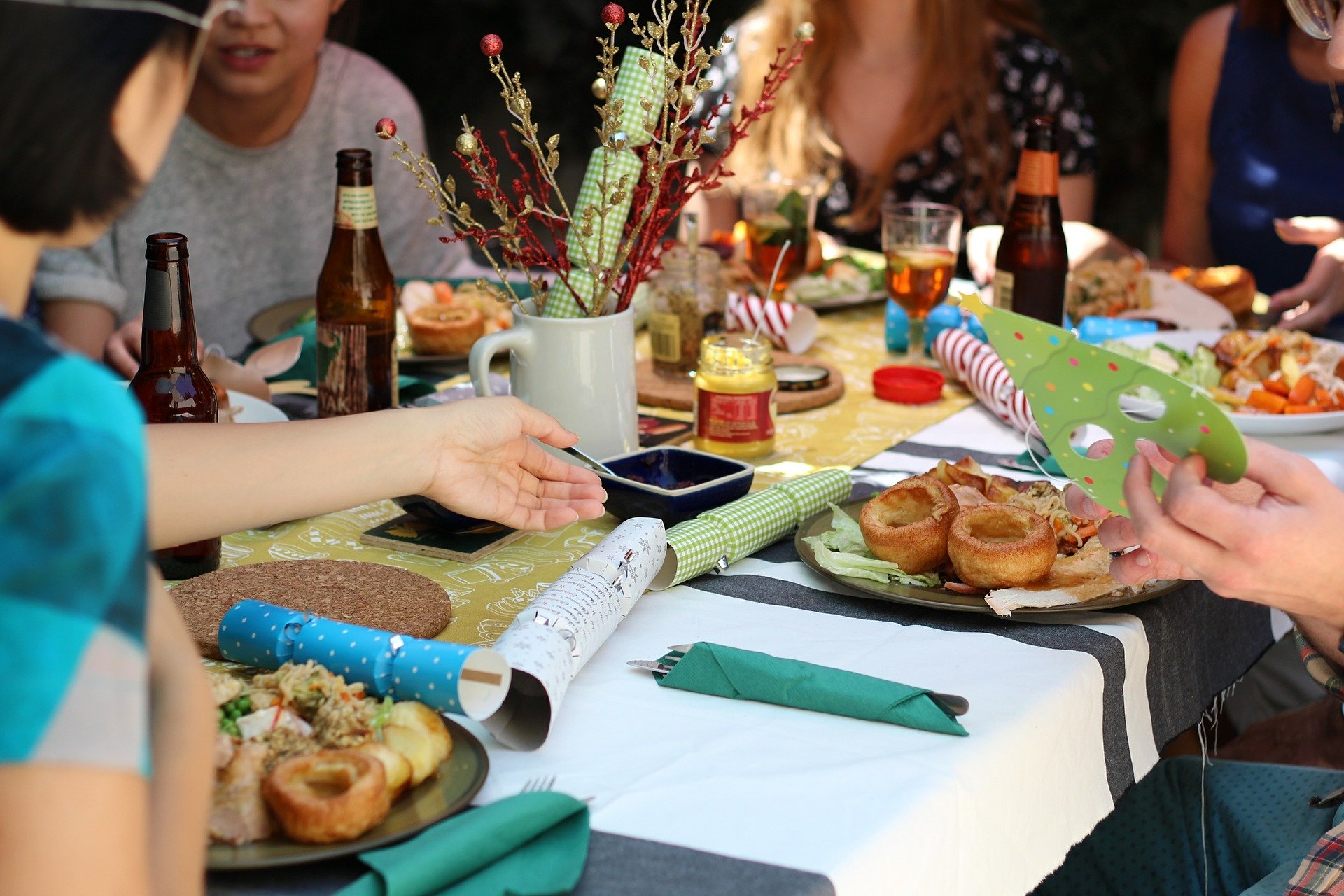
We’re in the midst of holiday season now, often a time when people who don’t have a peaceful relationship to food start to freak out a bit about eating.
Mainstream media doesn’t help, with its scare articles about avoiding holiday weight gain and how to not eat what you want at parties.
Within this type of diet culture, instead of enjoying the special food and company of friends and family in a relaxing way, we end up in fear and distraction. We play at restriction by trying not to eat the foods we want the most. But overeating might happen anyway – most likely because of that restriction mindset – and then we fall into the guilt-restrict-overeat cycle. This is a lousy way to spend the holidays!
The non-diet approach encourages you to approach eating in a different way. Sometimes accidental overeating happens, and that’s okay. Sometimes accidental under-eating happens and that’s okay too. No one is a perfect eater, nor should we be trying to be. The goal is peace with food, honoring internal cues most of the time, and not having constant worry about eating.
For those of you who are not in a place of peace with food just yet, Aaron and I created this Dietitians Unplugged podcast episode to help you on that journey. Get a mug of cocoa, take some deep, relaxing breaths, and have a listen.
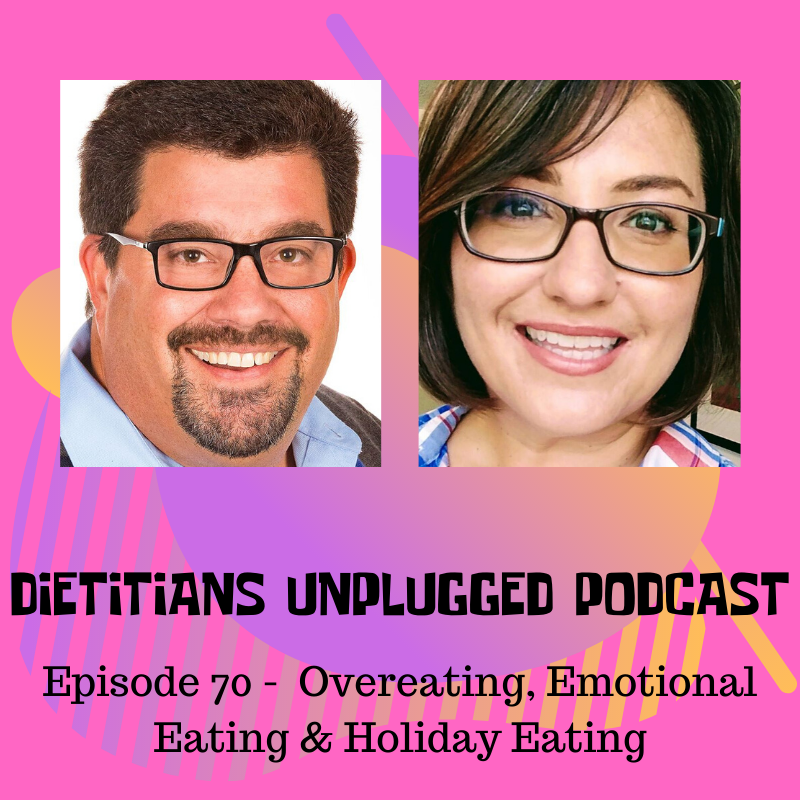
Show Notes:
Investigate the best seats on Seat Guru
Ragen Chastain has written about fat discrimination by airlines, and what can help
Listen on:
Start your path to normal eating with my free guide, 5 Strategies to Stop Overeating
Eating
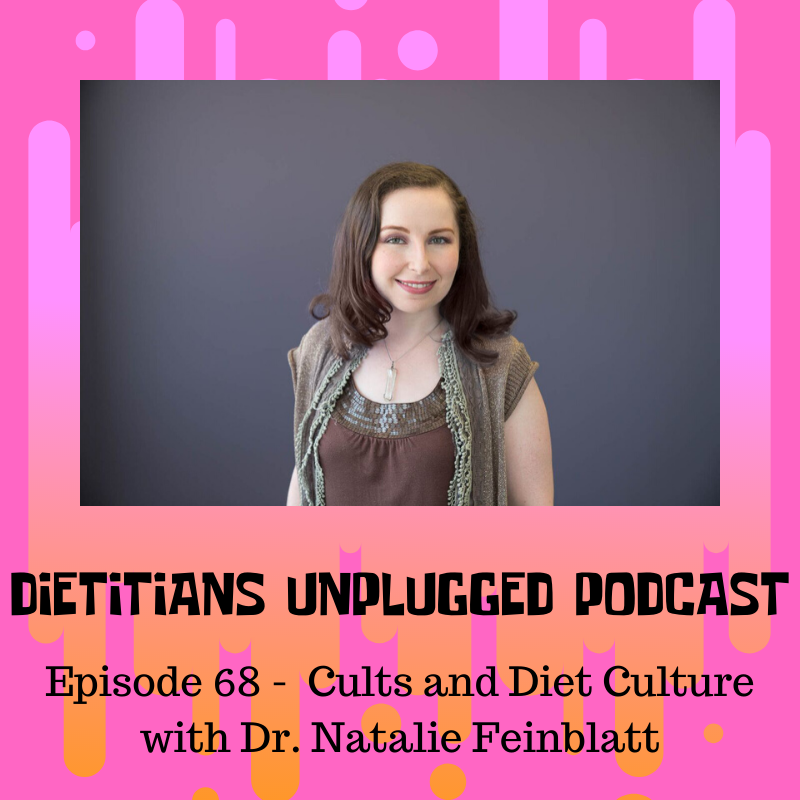
Did being on a diet ever feel like you were a member of a cult? Well, now we know there’s a reason for that!
In this episode of the Dietitians Unplugged podcast, Dr. Natalie Feinblatt, an expert in, among other things, working with former cult members, compares and contrasts cults with diet culture.
You’ll hear about what defines a cult, and how diets often align with these criteria. Most importantly, we discussed how to figure out if you’re in a diet cult and how to get free. (It’s hard for me to admit that this part was more important than our Days of Thunder discussion, but I’ll concede the point).
Dr. Natalie Feinblatt is a licensed clinical psychologist who sees clients in Los Angeles and virtually. She specializes in treating addiction, trauma, co-occurring disorders, LGBTQIA clients, and former cult members. She’s been working in the field of mental health for over 15 years at all levels of care, and earned her doctorate at Pepperdine University. You can learn more about her practice at her website, drnataliefeinblatt.com.

Show Notes:
Dr. Natalie Feinblatt’s website
Book: Diet Cults by Matt Fitzgerald
Listen on:
Subscribe and get my free guide:
Why you overeat …and what to do about it
Click here if you just want my newsletter!
Eating
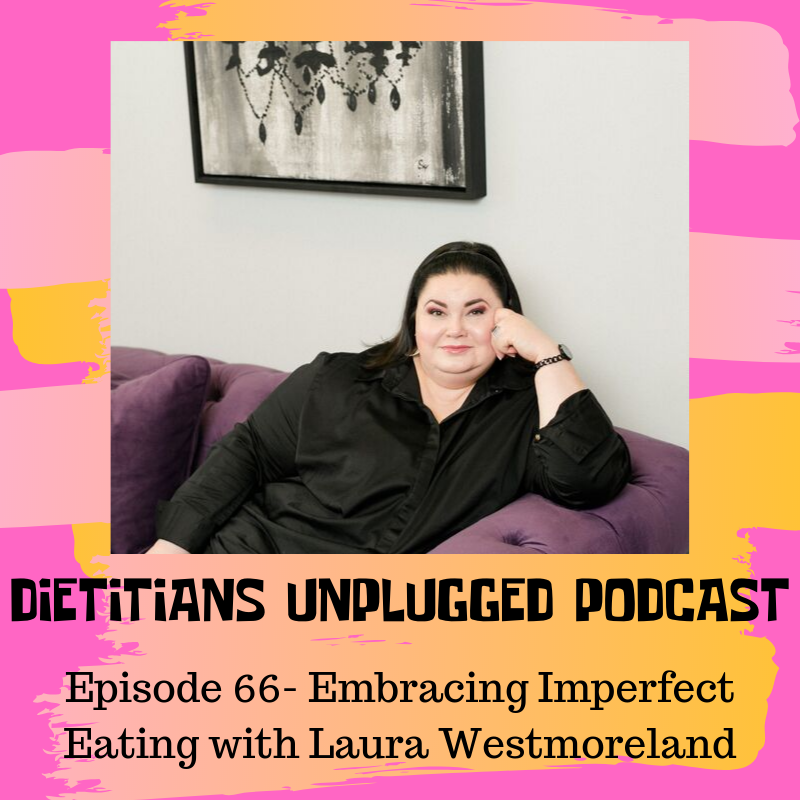
I am a recovering perfectionist.
I don’t know where I learned the idea that I needed to be perfect (not from my parents) but I really embraced this idea sometime in my teens and went whole hog on it by my 20s. I suspect it was a way to relieve anxiety about not being good enough in the world, but it eventually became an anxiety all on its own – and it never propelled me to where I wanted to go.
By the time I reached my late 30s and was back in school full-time, I was putting that perfectionism to use with great study habits and turning out amazing school work, but I was also wasting time, energy and stress because probably 90% of what I was doing didn’t need to be perfect. I have since learned when good enough is acceptable, and when to pull out that perfectionist streak (less often than you think).
I notice that my clients are often perfectionists, too. It’s my belief that anyone who has been on a diet for any amount of time is a perfectionist – even if they feel they “failed” the diet. Diets come with rules that you have to follow perfectly for “success” (except we know that failure is built-in to diets no matter how perfectly you follow them). When we begin to do the messy, ambiguous work of learning to honor body cues and appetite, perfection is not only needed, but it can hinder the process.
I was happy to talk about this subject with my wonderful colleague Laura Westmoreland, LMFT on the Dietitians Unplugged podcast. Laura, who is a certified Body Trust provider, talks about aiming for C level work when we’re learning how to trust our bodies. We don’t need to be perfect as we stumble towards compassionate connection with our bodies and ourselves, and in fact, expecting perfect work can even hold us back.
If you are a perfectionist and feeling anxious about not doing this work of learning to trust and respect your body “right”, then this episode is especially for you.
Show Notes:
Learn more about Laura: https://www.laurawestmoreland.com/
Follow Laura on Instagram
Listen on:
Subscribe and get my free guide:
Why you overeat …and what to do about it
Click here if you just want my newsletter!
Eating
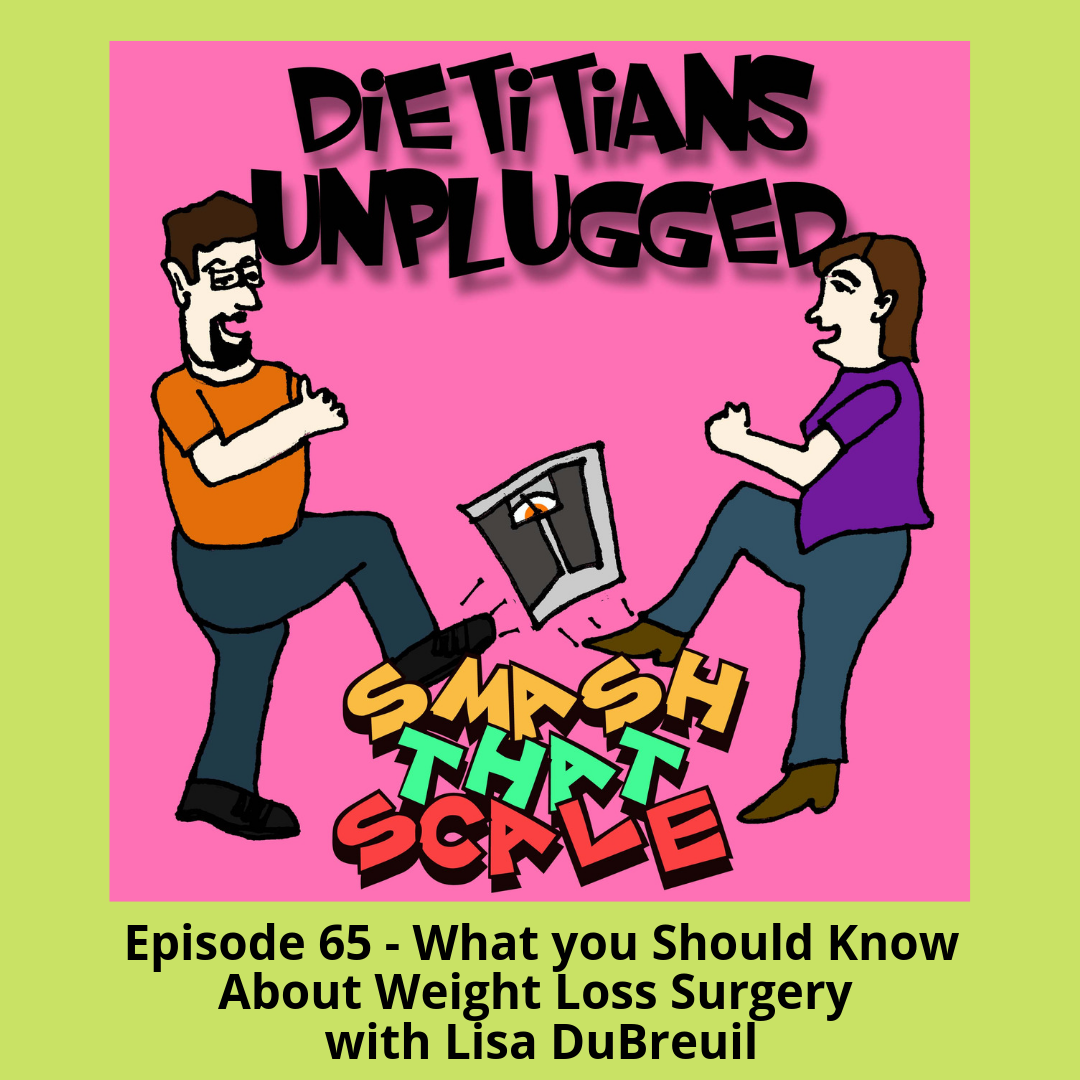
I want to be as transparent as possible about my feelings on this topic, so here goes.
I am not a fan of weight loss surgery.
I was not a fan of it when I first started to know people who were getting it, 20 years ago, even as I was steeped in diet culture. Twenty years later, I do not feel any better about it, based on the (scant) available evidence around the long-term outcomes, and on the personal evidence I have seen in my own life (weight regain, multiple surgeries, pain from surgery, and, sadly, even death). I don’t think the medical community does enough to prepare people for this surgery and the physical and psychological after-effects, and I don’t think it properly addresses possible underlying disordered eating which can continue even after surgery.
So that’s me. But I can’t make anyone’s decision for them. And I won’t judge anyone for choosing this surgery, especially in the fat-phobic culture we live in. What I can do is hold space for this kind of decision-making, and provide important information to help a person make a fully informed decision. (I, of course, prefer the path of radical body acceptance and Health at Every Size, but again, I can’t make that decision for others)
This Dietitians Unplugged podcast episode is part of providing that information. We talked to the wonderful, fierce HAES advocate Lisa DuBreuil, LICSW, who frequently works with clients who are considering or have undergone weight loss surgery. In this episode, we discuss the erroneous idea of “weight loss surgery as panacea”, how the medical community doesn’t do enough to prepare people before making this decision, and the possible medical and psychological consequences of having bariatric surgery.

Lisa’s website
Lisa on Twitter
Listen on:
Libsyn
Apple Podcasts
Stitcher
YouTube
Subscribe and get my free guide:
Why you overeat …and what to do about it
Click here if you just want my newsletter!
Eating
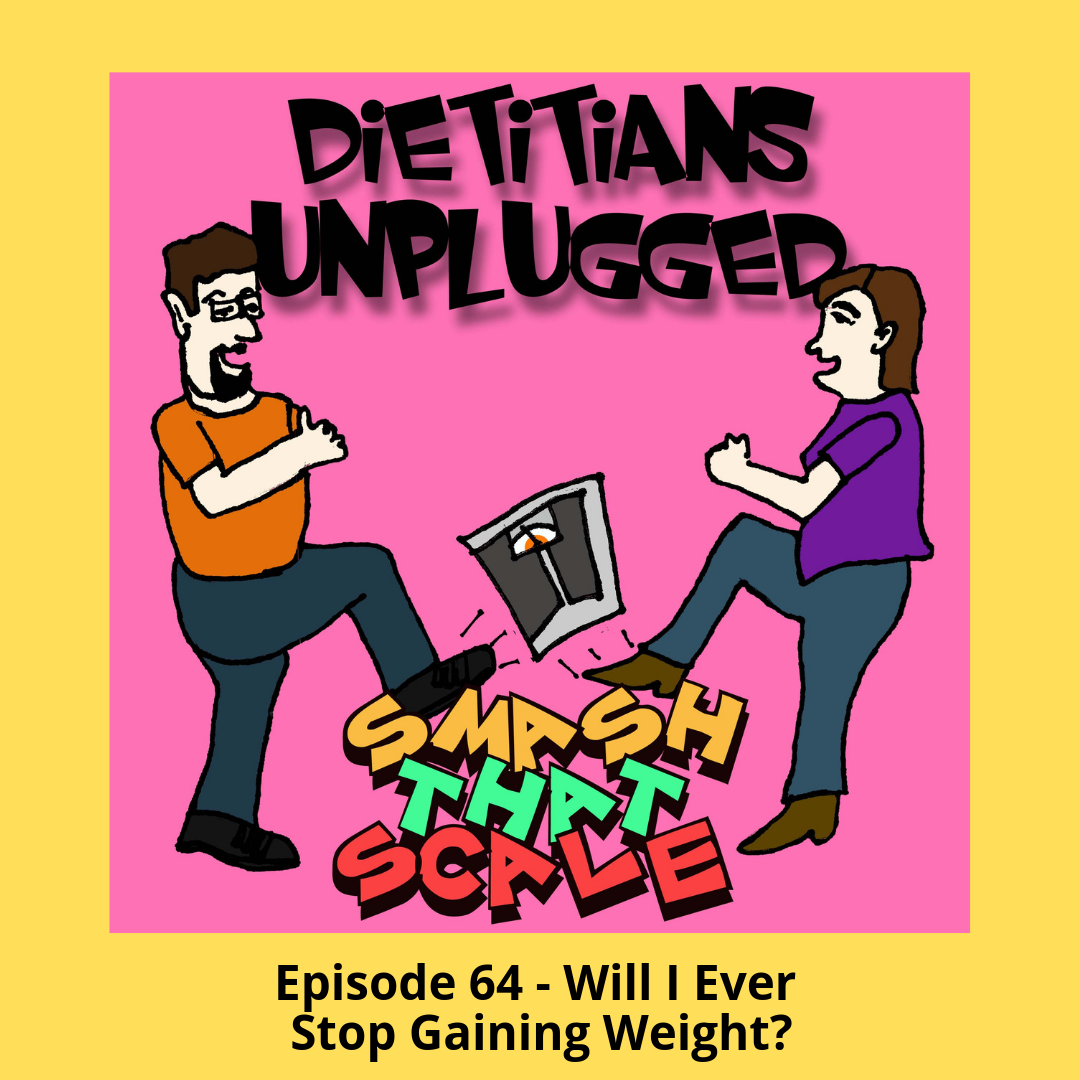
I hear this from my clients a lot: “I’m afraid I’ll never stop gaining weight!” Thanks to societal weight stigma, I understand why anyone would have this fear. Large bodies have long been stigmatized and no one wants to put themselves in the way of stigma.
At the same time, how do we control our weight as we go through the normalization process with food? The answer: we really can’t. After all, wasn’t it trying to control our weight, over and over, that got us in this mess of weight cycling and food struggles in the first place?
And yet – the pain of weight gain is real. We want to be relaxed, happy eaters, but when it comes with weight gain, the whole process can feel confusing and discouraging.
So in this Dietitians Unplugged podcast, Aaron and I talk about that fear, and also about caring for your body as it is now.

Show notes:
Undersummers Slip Shorts https://www.undersummers.com/
Other anti-chafing solutions: https://www.buzzfeed.com/nataliebrown/best-anti-chafing-products-save-your-thighs
Coach Cinder Ernst offers Plus Size Knee Pain Solutions
Listen on:
Libsyn
Apple Podcasts
Stitcher
YouTube
Subscribe and get my free guide:
Why you overeat …and what to do about it
Click here if you just want my newsletter!
Eating
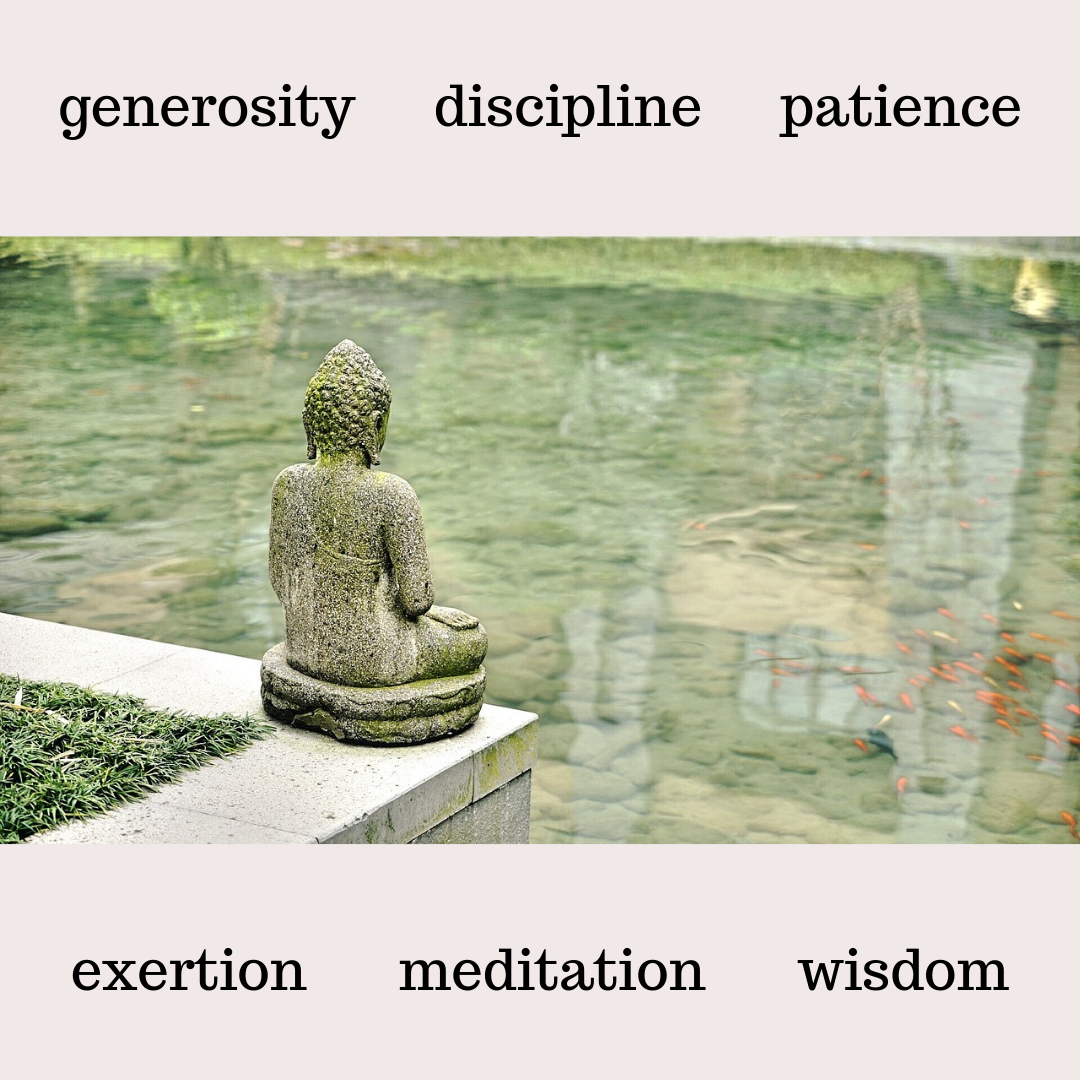
We welcomed Jenna Hollenstein, MS, RDN, CDN, author of the book Eat to Love: A Mindful Guide to Transforming your Relationship with Food, Body, and Life, to the podcast to talk about her framework, which is based in Buddhism, for healing disordered eating.
In this episode, she explains the six Paramitas (generosity, discipline, patience, exertion, meditation and wisdom) and how we can apply them in approaching intuitive eating. Her compassion-based framework asks us to see ourselves as a beloved other in learning how to listen to our inner wisdom and bring about sustainable, positive self-care.
Show Notes:
Find Jenna Hollenstein:
Subscribe and get my free guide:
Why you overeat …and what to do about it
Click here if you just want my newsletter!
Eating

In this episode of the Dietitians Unplugged podcast, we were thrilled to talk to Dr. Jennifer Gaudiani of the Gaudiani Clinic in Denver, CO which provides in-person and telehealth care to people with current or a history of eating disorders.
Dr. G is the author of the book Sick Enough, a Guide to the Medical Complications of Eating Disorders. She talked to us about her journey to becoming a non-diet aligned doctor, and how she realized that this is the only ethical way to treat patients, especially those in larger bodies. She explains her “house on fire” analogy which helps those who struggle to understand that they are already sick enough with their eating disorder and don’t need to delay treatment any longer. We think everyone will benefit from listening to this podcast – patients and doctors alike.
Show notes:
Sick Enough, a Guide to the Medical Complications of Eating Disorders
Subscribe and get my free guide:
Why you overeat …and what to do about it
Click here if you just want my newsletter!
Eating

Our bodies tell so much of the story of ourselves. In an ideal world, we’d be good friends with our bodies, appreciate them for what they allow us to experience of the world, and be in tune with what they tell us about those experiences. But because we don’t live in a perfect world, we can lose touch with the wisdom of our bodies. Or, because of past trauma, our bodies have become a scary place for us to be.
Getting back into our bodies can be a challenge, so we asked Tracy Brown, RDN, LD/N, a somatic nutrition therapist, how she helps people do just that. She talked about the effects of trauma on the body, how “feeling fat” isn’t really about body size at all, how the fight/flight/freeze reflex can keep us trapped in the diet cycle and how reconnecting with the body can help end the cycle.
And if you want to see body disconnection in action, I provided a spectacular example during this episode (you’ll probably know it when you hear it!). Last year was great professionally, but tough and also way too busy. I spent too much time working and growing, and not enough relaxing and regenerating. And I am someone that needs a fair amount of relaxation in order to function optimally for the long run. When we recorded this episode, I was experiencing the late effects of total body breakdown: exhaustion, headaches, and a real difficulty with concentration. It’s been a hard lesson in knowing my limits and learning to respect my body, but life is always a work in progress!
Care for Diabetes
Rebecca Scritchfield and I are working hard on a new, expanded offering of our weight-inclusive diabetes groups. Make sure to sign up on this page to be one of the first to find out when it launches.
Subscribe and get my free guide:
Why you overeat …and what to do about it
Click here if you just want my newsletter!
Eating
I work with many clients who have binge eating disorder or, if not an official diagnosis, definite binge eating behaviors. All are in different stages of recovery, and many make great progress with learning to eat in an unrestricted, nourishing way that they feel good about while also ceasing binge behaviors.
My clients also come in a range of body sizes, but most typically are in larger bodies. Given our culture’s view of fat bodies, it doesn’t surprise me at all when they eventually ask, “When can I start trying to lose weight again?”
The reality is, my clients are not strangers to dieting and weight loss. They have “succeeded” at weight loss many times, always with the inevitable weight regain that we know comes with weight loss attempts. They have developed extremely disordered eating, if not an eating disorder, and struggle to know the best way to feed themselves. So of course, I know that attempting to lose weight again is a disaster waiting to happen for their health, their eating, their mental health.
But sometimes we need to hear the stories of others to fully grasp the potential impact of certain behaviors (like dieting and restriction). That’s why I was thrilled to talk to Sunny Sea Gold, author of the book Food: The Good Girl’s Drug, about her recovery from and subsequent relapse back into binge eating disorder. We are all susceptible to diet culture, even in recovery, and we need to be reminded regularly that diets aren’t the answer and that they were often the likely cause of a lot of our problems with food and weight.
HAES-Focused Diabetes Care
Rebecca Scritchfield, RDN, of the Body Kindness book, and I have cooked up something wonderful for those with diabetes who don’t want to diet. Our Care for Diabetes Concerns has been getting rave reviews from participants, and we are working hard to expand access to this program this year. Get on our priority email list to find out when this group is happening next!
Subscribe and get my free guide:
Why you overeat …and what to do about it
Click here if you just want my newsletter!
